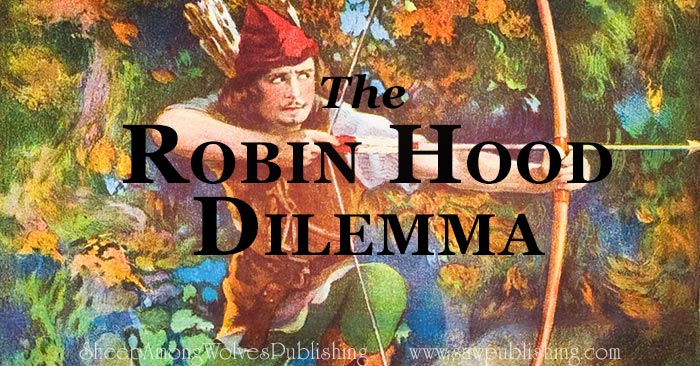The Robin Hood Dilemma: Recognizing Moral Inconsistencies in Literature

We are all familiar with the story of Robin Hood. He steals from the rich to give to the poor. An action that is otherwise considered evil (stealing) is perceived as good because the intent that prompts it is good (giving to the poor). For the Christian, such interweaving of good and evil creates a moral dilemma—do we side with the hero because he has good intentions, or do we reject his worldview because it is contrary to God’s ways?
Many books written for Christian readers have fallen into a trend wherein the greater percentage of the book dwells on the unregenerate life of the main character, and takes a few brief chapters, or sometimes merely paragraphs, to record the conviction, repentance and renewal of the sinner.
Recognizing the Problem
The main character, or hero of the story, is the person we identify with in a book. Usually they go through a series of challenges or obstacles that need to be overcome to allow the attainment of a main goal. The reader becomes wrapped up in the life of the hero, cheering him on, commiserating with his difficulties, hoping for his success.
When the majority of the text dwells on the sinful life of a likeable hero it blurs the line between good and evil. He is the hero after all. And while we might recognize his sinfulness, we become desensitized to it and begin to rejoice in his successes even if they directly oppose our moral beliefs. We hope the thief will get away with his heist, just as we do with Robin Hood. Such books are especially confusing and dangerous for children, who are still forming their views of right and wrong.
Responding to Moral Inconsistencies in Literature
Imagine our journey through the land of literature as though it were a trip to an unfriendly, foreign country. If we plan our trip accordingly, and keep a few facts in mind, we can come through the experience unscathed.
1. We Are in a Hostile Land
We are strangers and pilgrims in this world.
Hebrews 11:13—“These all died in faith, not having received the promises, but having seen them afar off, and were persuaded of them, and embraced them, and confessed that they were strangers and pilgrims on the earth.”
It is not our home, it is a foreign land with a hostile ruler.
2 Corinthians 4:4—“In whom the god of this world hath blinded the minds of them which believe not, lest the light of the glorious gospel of Christ, who is the image of God, should shine unto them.”
We are, in fact, as sheep surrounded by wolves. Wolves devour sheep. We must be constantly on our guard.
Matthew 10:16—“Behold, I send you forth as sheep in the midst of wolves: be ye therefore wise as serpents, and harmless as doves.”
If you were visiting a foreign, hostile country you would be very wary of their propaganda. Use the same discernment with regard to the books you read and allow your children to read.
Be sure you know
- who has written them,
- what their beliefs and agendas are, and
- what the content is.
1 Peter 5:8-9—“Be sober, be vigilant; because your adversary the devil, as a roaring lion, walketh about, seeking whom he may devour: Whom resist stedfast in the faith, knowing that the same afflictions are accomplished in your brethren that are in the world.”
2. We Are Easily Led Astray
We inherited that propensity from our earthly parents. And so have our children.
2 Corinthians 11:3—“But I fear, lest by any means, as the serpent beguiled Eve through his subtlety, so your minds should be corrupted from the simplicity that is in Christ.”
Well written, engaging literature can be a temptation. It is entertaining, it is exciting, it gives a sense of adventure and takes us out of our daily experiences.
1 Peter 2:11—“Dearly beloved, I beseech you as strangers and pilgrims, abstain from fleshly lusts, which war against the soul;”
It is easy to dismiss as harmless that which we know is wrong, convincing ourselves that we will not be affected by that which we recognize. God’s word teaches us otherwise.
Jeremiah 4:22—“For my people is foolish, they have not known me; they are sottish children, and they have none understanding: they are wise to do evil, but to do good they have no knowledge.”
We must recognize that our children, too, are easily influenced by those around them; the characters in books as well as the people they meet in real life.
Ephesians 4:14—“That we henceforth be no more children, tossed to and fro, and carried about with every wind of doctrine, by the sleight of men, and cunning craftiness, whereby they lie in wait to deceive;”
3. We Have a Guidebook
We need not fear, though, because we have a travel guide that will lead us safely through this land.
Psalm 119:105—“Thy word is a lamp unto my feet, and a light unto my path.”
Shine that light, the light of God’s word, on each piece of literature that you desire to read.
2 Timothy 3:16-17—“All scripture is given by inspiration of God, and is profitable for doctrine, for reproof, for correction, for instruction in righteousness: That the man of God may be perfect, throughly furnished unto all good works.”
Pray for God’s especial clarity and direction that you would choose to fill your mind with that which is pleasing to Him.
Psalm 32:8—“I will instruct thee and teach thee in the way which thou shalt go: I will guide thee with mine eye.”
You can stand on the promise of God that His Spirit will guide you, even in such a matter as this.
John 16:13—“Howbeit when he, the Spirit of truth, is come, he will guide you into all truth: for he shall not speak of himself; but whatsoever he shall hear, that shall he speak: and he will shew you things to come.”
4. We Must Follow It
A manual is only helpful if we apply its instructions.
Luke 11:28—“But he said, Yea rather, blessed are they that hear the word of God, and keep it.”
By searching the scriptures as the Bereans, we can discern what is in line with God’s word and what isn’t. For more on this topic, see our post entitled The True Source of All Good.
Acts 17:11—“These [the Berean Jews] were more noble than those in Thessalonica, in that they received the word with all readiness of mind, and searched the scriptures daily, whether those things were so.”
Simple obedience is not enough. While there is no specific direction in the Bible on what we should read and what we shouldn’t, we are clearly told what to think about good and evil.
Romans 16:19—“For your obedience is come abroad unto all men. I am glad therefore on your behalf: but yet I would have you wise unto that which is good, and simple concerning evil.”
Our reading choices should reflect our desire to seek good, not evil.
When a plot moves quickly past the sinful life of the hero to focus on his conviction, repentance, and regeneration, it affects the whole tone of the story, allowing the reader to identify with him in his pursuit of good rather than siding with him in his wrongdoings.
1 Corinthians 14:20—“Brethren, be not children in understanding: howbeit in malice be ye children, but in understanding be men.”
Look for stories that minimize the details of evil and focus on the that which is edifying.
Philippians 4:8—“Finally, brethren, whatsoever things are true, whatsoever things are honest, whatsoever things are just, whatsoever things are pure, whatsoever things are lovely, whatsoever things are of good report; if there be any virtue, and if there be any praise, think on these things.”
5. We Must Clothe Ourselves Appropriately for the Environment
“In ourselves we are utterly weak, and in ourselves we remain weak as we are by nature. Our strength is in the Lord; and by looking to God, through the Lord Jesus Christ, we receive wisdom, strength, help, and, in short, everything we can possibly need as we pass through this vale of tears.” – George Müller, Conversations with Christians
Clothed with the spiritual armour of Ephesians 6, we will be ready to stand against any wiles of the devil that we find in our reading materials.
 Ephesians 6:11-18—“Finally, my brethren, be strong in the Lord, and in the power of his might. Put on the whole armour of God, that ye may be able to stand against the wiles of the devil. For we wrestle not against flesh and blood, but against principalities, against powers, against the rulers of the darkness of this world, against spiritual wickedness in high places. Wherefore take unto you the whole armour of God, that ye may be able to withstand in the evil day, and having done all, to stand. Stand therefore, having your loins girt about with truth, and having on the breastplate of righteousness; and your feet shod with the preparation of the gospel of peace; above all, taking the shield of faith, wherewith ye shall be able to quench all the fiery darts of the wicked. And take the helmet of salvation, and the sword of the Spirit, which is the word of God: praying always with all prayer and supplication in the Spirit, and watching thereunto with all perseverance and supplication for all saints;”
Ephesians 6:11-18—“Finally, my brethren, be strong in the Lord, and in the power of his might. Put on the whole armour of God, that ye may be able to stand against the wiles of the devil. For we wrestle not against flesh and blood, but against principalities, against powers, against the rulers of the darkness of this world, against spiritual wickedness in high places. Wherefore take unto you the whole armour of God, that ye may be able to withstand in the evil day, and having done all, to stand. Stand therefore, having your loins girt about with truth, and having on the breastplate of righteousness; and your feet shod with the preparation of the gospel of peace; above all, taking the shield of faith, wherewith ye shall be able to quench all the fiery darts of the wicked. And take the helmet of salvation, and the sword of the Spirit, which is the word of God: praying always with all prayer and supplication in the Spirit, and watching thereunto with all perseverance and supplication for all saints;”
* For an excellent exposition on the armour of God, I recommend that you read Chapters 3 and 4 of Müller’s book.
It is our job as parents to be aware that the Robin Hood dilemma exists. Unless you recognize and respond to moral inconsistencies in literature, you will be sending your child as an unsuspecting traveller into a foreign, hostile land with no guidebook, no armour and no protection from the dangers that surround them.
This post may have been shared with the linkups listed here.
You might also like:

Having trouble finding well written, godly literature for your children to read? Peruse our top five sources of quality Christian books for inspiration.

We do need to be watchful of what we read because it does influence us. Thanks for these warnings to be careful.
Thanks for visiting Lisa. We can easily be forget how our reading material impacts us. Have a lovely day!